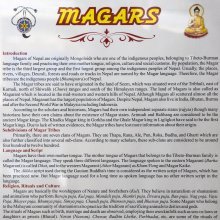Hunting: 2 definitions
Introduction:
Hunting means something in the history of ancient India. If you want to know the exact meaning, history, etymology or English translation of this term then check out the descriptions on this page. Add your comment or reference to a book if you want to contribute to this summary article.
Images (photo gallery)
India history and geography
Source: Singhi Jain Series: Ratnaprabha-suri’s Kuvalayamala-katha (history)Hunting (animals) represents a scene of human life commonly depicted on the Saṃsāracakra paintings in ancient India, as mentioned in the Kathās (narrative poems) such as Uddyotanasūri in his 8th-century Kuvalayamālā (a Prakrit Campū, similar to Kāvya poetry).—Page 185.21 f.: Here follows a description of a printed scroll illustrating the Jaina conception of saṃsāracakra. [...] The saṃsāra-cakra illustrated the three worlds of hell, human world and the world of gods. [For example:] The figure of a king riding on a horse and going for hunting; then the various animals trembling for fear of impending death; then a crowd of people making noise to bring the animals together, i.e., engaged in what is now known as hāṅkā;
Source: Heidelberg: Glory of the Tiruvanantapuram Padmanabhasvami TempleThe Hunting ceremony (in Sanskrit: Mṛgayā) or Hunting procession (known as Paḷḷiveṭṭa) forms part of the of the annual festival of the Thiruvananthapuram Temple, as mentioned in the seventh chapter of the Syānandūrapuravarṇana-prabandha by Svāti-Tirunāḷ (1813-1846) (one of the rulers of Travancore).—Accordingly, “A mock forest is fabricated in the middle of the public road nearly a kilometre from the temple. A tender-coconut is placed in this mock forest. The deities32 move out for the hunt when the conch is sounded at around 08.30 p.m. after the routine night procession inside the temple complex is concluded. The deities go out from the west gate and return through the north gate. On the way, they halt for the hunting ceremony. [...]”.

The history of India traces the identification of countries, villages, towns and other regions of India, as well as mythology, zoology, royal dynasties, rulers, tribes, local festivities and traditions and regional languages. Ancient India enjoyed religious freedom and encourages the path of Dharma, a concept common to Buddhism, Hinduism, and Jainism.
See also (Relevant definitions)
Starts with: Huntingdon willow.
Full-text (+1666): Mrigaya, Mrigavya, Shyainampata, Akheta, Akhetaka, Paparddhi, Paradhi, Upavyaghra, Acchodana, Gramadhana, Mrigayavyasana, Akshodana, Migava, Samutsarana, Shyainikashastra, Shvavyaghra, Jihvapa, Shikara, Dashakamajavyasana, Shaunika.
Relevant text
Search found 142 books and stories containing Hunting; (plurals include: Huntings). You can also click to the full overview containing English textual excerpts. Below are direct links for the most relevant articles:
Cosmetics, Costumes and Ornaments in Ancient India (by Remadevi. O.)
2.18. Dressing on the Basis of Profession < [Chapter 2 - Costumes]
2.1. Upper Garments (f): Kañcuka (tailored garment) < [Chapter 2 - Costumes]
1. Materials for Garments (d): Skin clothes from Animals < [Chapter 2 - Costumes]
Rig Veda (translation and commentary) (by H. H. Wilson)
Pallava period (Social and Cultural History) (by S. Krishnamurthy)
Depcition of Hunting < [Chapter 4 - Material Culture of the People]
Weapons and Warfare < [Chapter 4 - Material Culture of the People]
Hunters, Wood-cutters and Pastorals < [Chapter 3 - Socio-Religious Life]
Manusmriti with the Commentary of Medhatithi (by Ganganatha Jha)
Verse 7.45 < [Section IV - Duties of the King]
Verse 4.216 < [Section XIV - Other Duties]
Verse 7.47 < [Section IV - Duties of the King]
Heimskringla (by Snorri Sturlson)
Part 90 - Of The Swedish King Olaf's Hunting < [Chapter VII - Saga Of Olaf Haraldson]
Part 34 - Marriage Of Eirik < [Chapter III - Harald Harfager's Saga]
Garga Samhita (English) (by Danavir Goswami)
Verse 6.15.25 < [Chapter 15 - The Glories of Nṛga-kūpa and Gopī-bhūmi]
Verse 6.8.4 < [Chapter 8 - The Marriages of All the Queens]
Verses 4.15.16-17 < [Chapter 15 - The Story of the Women of Barhiṣmatī-pura, the Apsarās, and the Women of Sutala and Nāgendra]
Related products

